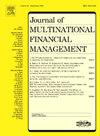Do the specific countries in which a multinational corporation operates affect its private loan contracts?
Abstract
Previous research has shown that higher levels of firm globalization lead to a lower cost of private debt. However, this research generally treats globalization as a homogeneous attribute ignoring the specific countries in which a multinational corporation (MNC) operates. Using a sample of U.S. MNCs from 1999 through 2017, we relax this assumption and find that while the results from prior research hold with regards to the level of an MNC’s operations in segments reported at the regional or continent-wide level, the level of an MNC’s operations in countries with low institutional quality is associated with a higher cost of bank debt. Our results are robust to controlling for firms’ choice to operate in countries with low institutional quality using self-selection models and propensity score matching. In additional testing we find that the level of MNCs operations in countries with low institutional quality is negatively associated with the inclusion of collateral requirements in private lending agreements, but is not associated with the maturity of the loan or the number of covenants included in the lending agreement. Finally, we find that firms’ segment disclosure choices vary around new loan issuances in a manner consistent with management being aware that operations in low institutional quality are perceived by lenders to indicate higher credit risk.

 求助内容:
求助内容: 应助结果提醒方式:
应助结果提醒方式:


